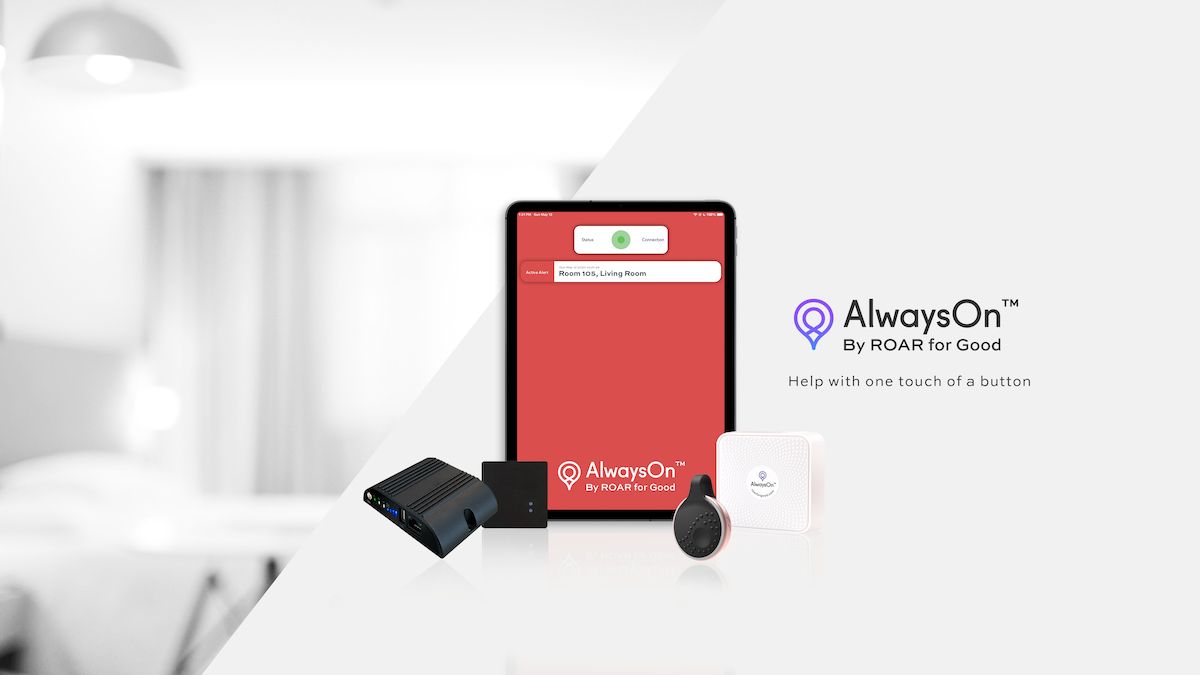ROAR for Good, maker of a personal safety devices for hospitality and other workers, had a challenging year as it navigated the pandemic’s impact.
CEO and cofounder Yasmine Mustafa had pivoted the company from B2B to hospitality right as COVID-19 made it one of the hardest-hit industries of 2020. But she kept her eyes on legislation requiring hotels to provide their staff with personal safety devices, and by the early this year, the company had inked a deal to get the devices into more than 11,000 hotel rooms.
This week, the company celebrated another long-sought success: A patent application for its Bluetooth-enabled, low-energy mesh network system — the tech center to its network of wearable safety devices AlwaysOn — was approved.
The technology ensures that the signal doesn’t hit blindspots that other systems are vulnerable to, Mustafa told Technical.ly. Such systems use a lot of power, and usually rely on being plugged into the wall, the CEO said. But ROAR’s technologists were able to figure out how to run the Bluetooth technology on batteries, which allows more freedom of movement without the risk of a connection being cut off by a device being unplugged.
“Instead of relying on where power grid is, now we can place them wherever they need to be,” Mustafa explained.

Yasmine Mustafa. (Courtesy photo)
Mustafa said their original patent application was submitted in late 2019, after testing the technology for about a year. It was initially denied. But they brought on technology lawyer Frank Bruno, who was able to parse out that the patent board had misunderstood how the Bluetooth technology worked and deemed it too similar to others out there. With his specialized knowledge, they reapplied and were given the patent this week.
“This was an engineering initiative we undertook to ensure that our customers were protected with the strongest defense possible – a closed system of mesh nodes that need only a low-grade battery power to operate,” said Rich Nelson, cofounder and VP of product and hardware development, in a company statement. “Our system is always reporting out data — regardless of how a hotel’s WiFi or LTE is performing — allowing AlwaysOn to be one of the most reliable and accurate location-based panic buttons for the hotel community and other appropriate markets.”
As the company’s head, Mustafa had always been asked in pitches and investor meetings if she had a patent for the technology.
“You always hear about how important intellectual property is, how it builds barriers to entry,” she said. “We have now built it in a tremendous way, built on something no one has done yet in a vertical where many have been impacted by the pandemic and where many are assessing their finances.”
Mustafa is currently presenting the product and its technology at the HITEC conference in Dallas this week, and was excited that the patent came through in time to present it along with the company’s new ROI calculator. The calculator helps hoteliers see the cost savings and safety advantages of the one-time cost of the devices that will hopefully get them seeing the service as an overall benefit, she said.
The patent also will help the team envision the ways in which the technology is applicable across industries. ROAR is currently in a three-month pilot in the healthcare space as violence against healthcare workers has risen amid the pandemic.
“It’s been a hard 18 months,” Mustafa said. “The fact we were able to make the decisions we needed to and get this patent on top of it, is incredibly exciting. The patent is a huge win.”
Before you go...
Please consider supporting Technical.ly to keep our independent journalism strong. Unlike most business-focused media outlets, we don’t have a paywall. Instead, we count on your personal and organizational support.
3 ways to support our work:- Contribute to the Journalism Fund. Charitable giving ensures our information remains free and accessible for residents to discover workforce programs and entrepreneurship pathways. This includes philanthropic grants and individual tax-deductible donations from readers like you.
- Use our Preferred Partners. Our directory of vetted providers offers high-quality recommendations for services our readers need, and each referral supports our journalism.
- Use our services. If you need entrepreneurs and tech leaders to buy your services, are seeking technologists to hire or want more professionals to know about your ecosystem, Technical.ly has the biggest and most engaged audience in the mid-Atlantic. We help companies tell their stories and answer big questions to meet and serve our community.
Join our growing Slack community
Join 5,000 tech professionals and entrepreneurs in our community Slack today!

The person charged in the UnitedHealthcare CEO shooting had a ton of tech connections

From rejection to innovation: How I built a tool to beat AI hiring algorithms at their own game

How a laid-off AI enthusiast pivoted to become a founder — while holding down a day job



